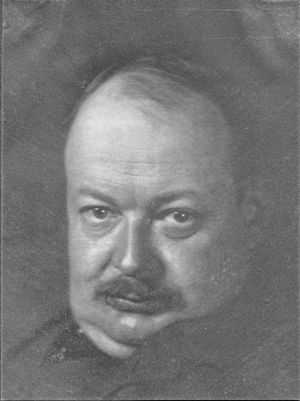John McTaggart Ellis McTaggart
1866-1925.  Philosopher; Lecturer in Moral Sciences. Atheist, yet supported Church of England.
Philosopher; Lecturer in Moral Sciences. Atheist, yet supported Church of England.
John McTaggart was an idealist metaphysician, a Fellow and Lecturer in Philosophy at Trinity for most of his life. He was an exponent of the philosophy of Hegel and among the most notable of the British idealists.
He was born John McTaggart Ellis, the second and eldest surviving son of Francis Ellis, a county court judge, and his wife, Caroline Ellis. He was named in honour of John McTaggart, an uncle of his father, and soon afterwards acquired McTaggart as a surname also, when his father adopted it as a condition of inheriting that uncle's wealth. After attending a prep school in Weybridge (from which he was allegedly removed for announcing that he did not believe in God), McTaggart went to school in Caterham and then to Clifton College, Bristol. He studied moral sciences at Trinity under Henry Sidgwick and James Ward, and was placed alone in the first class of the moral sciences tripos in 1888. He was an active member of the Union Society, of which he was elected president in 1890. In 1891 he was elected to a prize fellowship at Trinity, and in 1897 he was appointed College Lecturer in the Moral Sciences, holding this post for twenty-five years.
McTaggart's early work, and his first three books, were devoted to Hegel and to his support of the dialectical method. However, he rejected many of Hegel's particular steps: he thought that Hegel often deceived himself and his readers by giving to his categories names taken from concrete empirical facts, and he rejected almost all the applications which have been made of Hegelianism to ethics, politics, and religion.
In Some Dogmas of Religion (1906), his only work of popular philosophy, McTaggart he takes the doctrine of pre-existence, rebirth, and post-existence as a hypothesis, and defends it with great ingenuity against the more obvious objections. In this book he also discusses free will and determinism, arriving at a completely deterministic conclusion, and the omnipotence of God. On the latter subject he concludes that the existence of a non-omnipotent and non-creative God is the utmost that can be granted to be philosophically possible. In The Nature of Existence (1921-1927 (posth.) his conclusions are even more definitely atheistic. This work is remarkable for the strenuous attempt which the author makes to deal satisfactorily with the existence of error and illusion, particularly the illusion of time and change, in a world of eternal beings perfectly related to each other.
McTaggart was a man of great wit and great administrative ability. He felt a passionate affection for his friends, for his school and college, and for his country. His ‘extremely virulent’ patriotism (Dickinson, 108) was expressed during the First World War when, as well as working in a munitions factory and as a special constable, he took a leading part in the expulsion of the pacifist Bertrand Russell from Trinity. McTaggart was for many years an active member of the governing body of Clifton College, and he gave great help to Trinity in drawing up the new statutes imposed upon it by the statutory commission. In his youth McTaggart's political opinions were radical but, influenced partly by his reading of Hegel and partly by the great loyalty he developed towards long-standing institutions such as those of Cambridge, he became increasingly conservative, even to the extent that, although an atheist, he was a keen supporter of the Church of England. In national politics he was a free-trade unionist. Traces of his earlier radicalism persisted. He was a supporter of women's suffrage and in university politics, too, he was a strong feminist and an advocate of wide-ranging reforms. He had an extraordinary knowledge of English novels, both past and contemporary, and of eighteenth-century memoirs. The honorary degree of LLD was conferred on him by the University of St Andrews in 1911 and he was elected a fellow of the British Academy in 1906.
| Memorial inscription | Translation |
|
JOHANNES MCTAGGART ELLIS MCTAGGART LITT.D. MDCCCLXVI – MCMXXV Homo liber de nulla re minus quam de morte cogitat: |
John McTaggart Ellis McTaggart, Litt.D., lived 1866-1925. He was a pupil of Clifton College, and Fellow and Lecturer in Moral Sciences in this College. He devoted to Philosophy the life which he acknowledged as her due. ‘The free man thinks about nothing less often than about death, and his wisdom is the preparation not for death, but for life.’ [Spinoza Ethics, Part 4, Proposition 67] |
John McTaggart Ellis McTaggartBrass located on the north wall of the Ante-Chapel. |
|
|
|
PREVIOUS BRASS |
|
NEXT BRASS Hubert Stanley Middleton |
| Brasses A-B | Brasses C-G | Brasses H-K | Brasses L-P | Brasses R-S | Brasses T-W |

